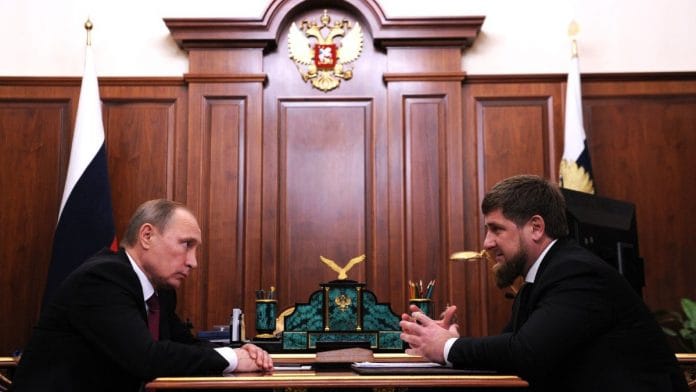New Delhi: Ramzan Kadyrov, the controversial, sanctions-hit head of Chechen Republic and a key supporter of Vladimir Putin’s invasion of Ukraine, has said that he wants to leave his post.
In a video released on his Telegram channel last week and translated by The Financial Times, Ramzan says that he is the longest-serving head of a Russian province and declares, “my time has come, before they kick me out”.
Ramzan Kadyrov just released a weird video in which he says he is the longest-serving Russian governor and thinks “my time has come, before they kick me out.”
Is he resigning???
Warning: extremely high DPM rate (dons-per-minute) here pic.twitter.com/hejr1hpNnI
— max seddon (@maxseddon) September 3, 2022
Since 2007, Ramzan has served as the head of the Chechen Republic in Russia’s North Caucasus. During his rule, Ramzan has created a “larger-than-life image” for himself through opulent displays of wealth, being regularly filmed with guns, and seen with the military. According to the BBC, he was “becoming a sort of cult leader”.
His reign, however, has been marred by allegations of severe human rights violation, including overseeing and turning a blind eye to extra-judicial killings, abductions, torture, and the complete suppression of dissent. Ramzan has also passed suppressive laws against the LGBTQ community.
In the video released by Ramzan, he also says, “We have a proverb among Caucasians, Chechens. No matter how respected and long-awaited a guest is, if he leaves on time, then it is even more pleasant…My time has also come.”
Also read: From ‘top secret’ to Twitter — How Ukraine war turned global spy agencies into ‘influencers’
Ramzan first fought against Russia & then supported Putin
After the fall of the Soviet Union, in the 1990s, Chechen nationalists wanted to break away from Russia. Ramzan’s father, Akhmad Kadyrov, was among the leaders of the pro-independence forces who fought against Russia during the first Chechen War in 1994.
Ramzan also fought against the Russian forces during this war that lasted for two years, and the Chechen fighters were able to maintain de-facto independence from Russia.
President Putin launched a campaign in 1999 to retake Chechnya. This time Akhmad decided to side with Russia. Russia established control over the capital of Grozny in 2000. However, an insurgency continued till 2009. In 2003, with Putin’s support, Akhmad was elected the president of the region. But he was killed in a bomb blast a year later.
After his father’s death, Ramzan started to consolidate power and served as the Chechen Republic’s first deputy prime minister. He next became the Republic’s prime minister, before serving as the first head of the Republic.
Armed by a loyal private militia — Kadyrovtsy — Ramzan has governed Chechnya like his personal fiefdom. Central to Ramzan’s reign has been unwavering and unequivocal support for President Putin. In return for this support, Chechnya has received generous subsidies from Moscow, at times accounting for nearly 80-82 per cent of the region’s budget.
Apart from silencing any critics of his regime, Ramzan has also displayed no tolerance for those critical of President Putin.
Support for Ukraine war & sanctions by the US
Ramzan has been a vocal supporter of Russia’s invasion of Ukraine. He has sent Chechen soldiers to be a part of the initial wave of assault on Ukraine. Elite units from the Chechen Army were also reportedly given the responsibility to assassinate key Ukrainian leaders during the first two days of the invasion. Ramzan has even said that he was in Ukraine during the early days of the war. However, this claim remains unverified.
Ramzan was also a big supporter of Putin’s campaign in Crimea. The US has imposed sanctions on him for “serious human rights abuses” in December 2020.
Samuel Ramani, an associate fellow at London’s Royal United Services Institute for Defence and Security Studies, told The Telegraph that Ramzan’s resignation would be a massive blow to Putin, if he would go through with it.
Some analysts felt that it was a hedge by Ramzan to get some concessions out of Putin, arguing that this threat had been used in the past.
Also read: Ukraine’s munitions might be coming from unlikely source — Russia’s new friend Pakistan






